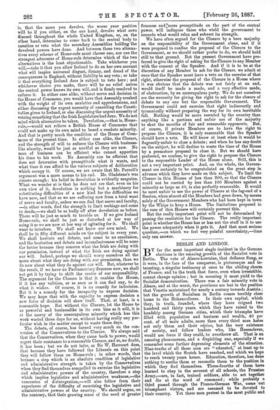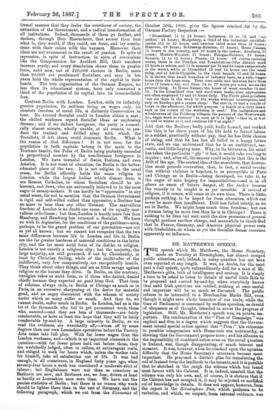BERLIN AND LONDON.
BY far the most important single incident in the German .1.1 elections is the amazing growth of the Socialist vote in Berlin. The vote of Alsace-Lorraine, that defiance flung, as it were, in the face of the conqueror, is picturesque and in- teresting, a singular testimony at once to the abiding charm of France, and to the truth that force, even when irresistible, cannot change opinion ; but in meaning it must yield to the Socialist demonstration. There was a fair minority vote in Alsace, and at the worst, the provinces are but in the position that Venetia maintained for nearly a century towards Austria ; but the growth of Socialism in Berlin comes terribly close home to the Hohenzollerns. In their own capital, which they, in truth, founded, where they have reigned two hundred and thirty years, which they have raised to the headship among German cities, which their triumphs have filled with population and business and wealth, 40 per cent, of all male adults, more than every third man hates not only them and their riginie, but the very existence of society, and follow leaders who, like Hasenclever, would use force if they could, to overthrow all. That is an amazing phenomenon, and a dispiriting one, especially if we remember some further depressing elements of the situation. Nine-tenths of all these men are "educated," at least up to the level which the Scotch have reached, and which we hope to reach twenty years hence. Education, therefore, has done nothing to soothe them or reconcile them to the position in which they find themselves. Three-fourths of them have learned to obey in the severest of all schools, the Prussian Army,—are, in fact, trained soldiers, able to act together and die at the word of command ; while probably a third passed through the Franco-German War, came out triumphant victors, and are assumed to be devoted to their country. Yet these men protest in the most public and
formal manner that they desire the overthrow of society, the extinction of the Government, and a radical transformation of all institutions. Indeed, thousands of them go farther, and declare, through Herr Hasenclever, that sooner than bear what is, they would, if they could, use force, and try conclu- sions with their rulers with the bayonet. Moreover, their ideas are not evanescent or the result of passion. In spite of repression, in spite of instruction, in spite of concessions like the Compensation for Accident Bill, their numbers increase yearly, and every dissolution shows them in greater force, until now, out of 220,000 electors in Berlin, MOM than 90,000 are proclaimed Socialists, and may in ten years hold the whole representation of the capital in their hands. The iron organisation of the German Empire, no less than its educational system, have only converted a third of the population of its capital into its irreconcilable foes.
Contrast Berlin with London. London, with its infinitely greater population, its millions living on wages only, its absolute freedom of social life, is distinctly Conservative in tone. No avowed Socialist could in London obtain a seat ; the skilled workmen regard Socialist ideas as unpleasing dreams ; and if we deduct foreigners, the party is numeri- cally almost minute, wholly unable, at all events, to pro- duce the trained and drilled army with which the Socialists, if left alone, could dominate Berlin. What is the reason of that difference ? It is not race, for the
population in both capitals belong in the main to the Teutonic family, the Poles of Berlin being probably exceeded in proportional number by the non-German foreigners in London. We have townsful of Swiss, Italians, and even Asiatics. It is not want of education, for Berlin is the better- educated place of the two. It is not religion in the usual sense, for Berlin officially holds the same religion as London, while the largest bodies which dissent from it are Roman Catholics, to whom Socialism should be ab- horrent, and Jews, who axe universally believed to be the most eager of money-makers. It can hardly be "oppression" in any usual sense, for not to mention that the German Government is rigid and self-willed rather than oppressive, a Berliner has no more to bear than any other German. The marvellous freedom of London is no doubt one cause of its equally mar- vellous orderliness ; but then, London is hardly more free than Hamburg, and Hamburg has returned a Socialist. We have no wish to dogmatise, for the conditions of the problem—soon, perhaps, to be the grand problem of our generation—are not as yet all known ; but we cannot but recognise that the two main differences between life in London and life in Berlin are the far greater hardness of material Conditions in the latter city, and the far more acrid form of its dislike to religion. London is not exactly a religious city ; but the majority, the large majority, are still governed, if not by Christianity, at least by Christian feeling, while of the multitudes of the indifferent, very few comparatively are energetically hostile. They think about other things, and are as little savage against religion as the horses they drive. In Berlin, on the contrary, irreligion takes an acrid form, as if those who denied, denied chiefly because they expected no good from God. That form of atheism always ends, in Berlin or Chicago as much as in Paris, in an excessive sharpening of the desire for material good, and an angry discontent with the scheme of society under which so many suffer so much. And they do, we cannot doubt, suffer much in Berlin. In London, bad as is the lot of the thousands who fail to get permanent work, those who succeed—and they are tens of thousands—are fairly comfortable, or have at least the hope that they will be fairly comfortable by-and-by. A large minority in Berlin, as we read the evidence, are wretchedly off,—worse off by some degrees than our own Lancashire operatives before the Factory Acts came into full play. With far lower wages than the London workmen, and—which is an important element in the question—with far fewer prizes held out before them, they are wretchedly lodged, often in cellars, at extravagant rents, and obliged to work for hours which, unless the worker toils for himself, take all satisfaction out of life. It was bad enough, in all conscience, in England forty years ago, when seventy-four hours a week was considered a moderate stint of labour ; but Englishmen were not then as conscious as Berliners are now, and Berliners are, we fear, driven at least as hardly as Lancashire men were then. We have not the precise statistics of Berlin ; but there is no reason why work should be lighter there than in the rest of Germany, and the following paragraph, which we cut kern the Economist of
October 30th, 1886, gives the figures vouched for by the German Factory Inspectors
Dusseldorf, 11 to 12 hours; bollermen, 12 to 13, and not seldom' 24 hours ; Madgebnrg, a third of the industrial establish- ments 111 to 12 hours, and another third more than 12 hours; Hanover, 10 hours ; Schleswig-Holstein, 11 boors; ileese-Naseas, 11 hours in the country, and 10 hours in the tense; Arnaberg, 11 hours; Iiiinden-Ifiinster, 11 hours; Cologne-Coblenz, 12 hours; Bavaria, 11 to 12 hours; Planes, 12 hears. Of cotton.spinoiog works, those in the Potsdam and Frankfort-on-Oder district work
12 hours in winter, and 14 in summer (or 72 and 84 hours respectively in the week), while at Dusseldorf 13 and 14 boors are the usual thing, and at Aix-la-Chapelle, in the cloth branch, 11 and 12 hours. It is shown that small branches of industry have, as a role, longer hours than the large ones. Thus corn-mills and bakeries have train 12 to 17 hours a day, and from 74 to 77 hours per week seems the general thing. In Hesse-Nassau, the hours of work number It and 16. In the Diisseldorf iron and steel-ware trade, even apprentises are often employed 14 and 16 hours daily. The Furth glastrpolishers 'are six days in the week at the works without interruption, and only on Sundays get a proper sleep.' The rule is, to rest a couple of hours in the afternoon, for which purpose 'a bench or a dirty straw sack in the corner of the workshop is used.' The unlit:natters and wiredrawers of the Feldberg villages, the potters of the Westerwald, &c., begin work in summer 'as soon as it is light '—that is, at 4 or 5—and in winter at 6, and continue till 8 at night."
Add that the Berliner, badly paid, badly housed, and worked like this, is for three years of his life held to forced labour as a soldier, practically without pay, that he has little chance of rising, and that he has lost all belief in a happy future state, and we can understand that he is an embittered, sar- castic, and little-hoping man. Why, in its bitterness, his mind has taken the particular " ply" it has, it would take too long to inquire ; and, after all, the answer could only be that this is the drift of the age. The central idea of the anarchists, that destruc-
tion must precede renovation, that, in fact, a social revolu- tion without violence is hopeless, is as perceptible in Paris
and Chicago as in Berlin—being developed, we take it, by the anger of men hoping for impossibilities—and is in all places an omen of future danger, all the darker because
the remedy to be sought is as yet invisible. A revival of religion, if it comes, will come at its own time. There is little, perhaps nothing, to be hoped for from education, which can never be more than insufficient. Drill has failed totally, as we see in Berlin. We might hope much from freedom ; but can a human being be more free than he is in Chicago ? There is nothing to be done but wait until the slow processes of general thought produce another change, and meanwhile to thank God that in France, Germany, and America physical power rests with freeholders, on whom as yet the Socialist dream exercises apparently no influence.



































 Previous page
Previous page